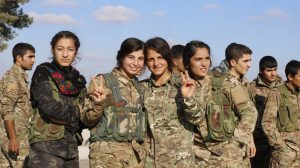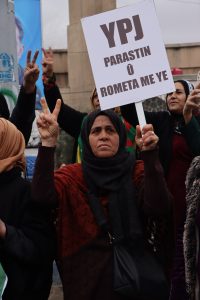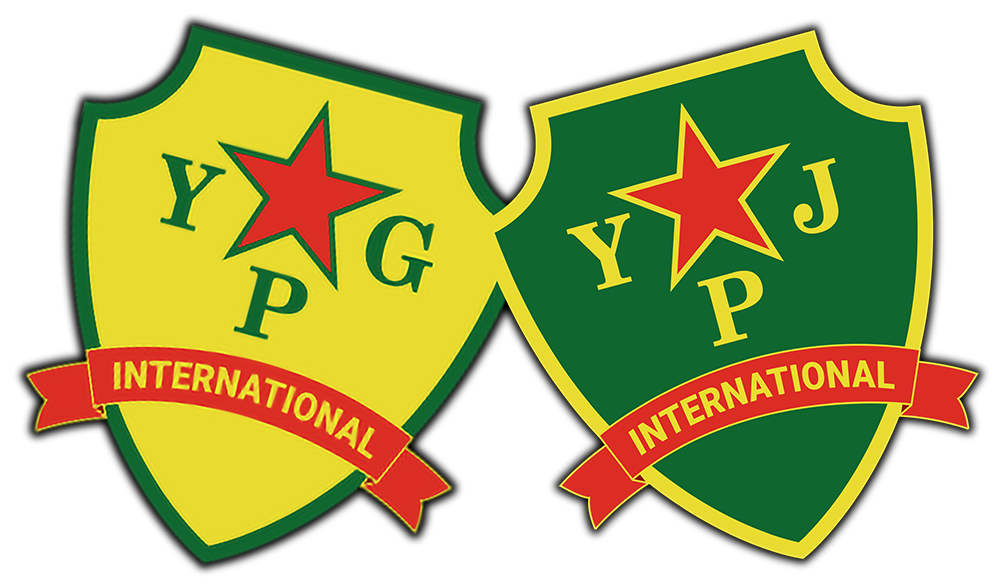“With YPJ we had found a hidden treasure – a treasure of hope and trust”
Experiences of an Internationalist in YPJ
I wrote this text during my time in the YPJ in 2019, and now that the YPJ is again resisting with full commitment and some of the comrades have become immortal, I think it is important to share my impressions. I hope that more people will get to know and better understand the YPJ. The current resistance is taking place in Tisrin and Qereqocaq, but it affects us all.
A few months ago, I joined the YPJ. YPJ is the women’s army of Rojava. Since its foundation, they have been defending the people of North and East Syria against the ongoing attacks by IS, Turkey and other enemies of the revolution. I got to know the Kurdish movement, and the Kurdish Women’s Movement in particular, four years ago. At that time, I had just entered the world of climate activism and was looking for alternatives to the system that is destroying our world at breakneck speed. By chance, I met a couple of comrades who had just returned from Rojava. Huddled around the fire, we listened intently to their stories. They filled us with hope and reminded me that I am not alone in the search and fight for a more just world. It felt as if we had found a hidden treasure – a treasure of hope and trust. I was particularly captivated by the stories of the women who took part in the fight against IS and especially in the defense of Kobane. These women, some of them still girls, took up arms defeating social norms and defended their homeland. They knew only too well what was in store for them if they lost this battle. But it wasn’t just their stories that inspired me, the way the comrades treated each other and us was also somehow different. There was a seriousness and a special warmth in the air that made it feel as if we could make dreams come true.
In the months and years that followed, I got to know the Kurdish movement better and better and realized that I too could be a part of it. The idea of traveling to Rojava came to me that very first evening – to see the revolution with my own eyes. I wanted to get to know those who have been working for years to build an alternative against all odds, enemies and obstacles. I realized more and more that I wanted to turn words into actions. I really wanted to stand by the Kurdish women and express my rejection of the complicity of the European states. I also wanted to learn where this almost infinite strength and hope comes from, but it took four years before I had the courage to take this step. After many discussions, a few tears and many more hugs, I set out on a path that so many have chosen before me. I am following in the footsteps of Sehid Helin, a British woman who joined the YPJ in the fight against IS. Over the last year, her stories have encouraged me to keep going. Her courage, her will, her difficulties and, above all, her fight have always given me strength. Sehid Helin was murdered in 2018 by a Turkish airstrike during the occupation of Afrin.
I believed the system that women can’t defend themselves and are always dependent on others
When I came to Rojava, I had a great desire to become part of the YPJ, but self-doubt stopped me at first. I told myself that I wasn’t athletic enough, that I was too emotional and that I wouldn’t dare to really go to war. More deeply, I believed the system that women can’t defend themselves and are always dependent on others – even if I only admitted that to myself here. I unconsciously equated the YPJ with a state, male army and so naturally couldn’t see my place in it. Yet the YPJ is the protective armor of a revolution and not of the system. This means that its core is different and this is evident in all aspects. For example, YPJ educations are always partly military and partly ideological.
During my first few months in Rojava, I got to know the revolution from other angles. I slowly realized that I am stronger than I thought. I realized that my fears were unfounded and that I could be part of the YPJ with all my strengths, weaknesses and difficulties. During this time, it was explained to me again and again that anyone who chooses to do so can be part of this revolution. I learned that the mind and the will are more important than physical abilities. And so the Kurdish movement and the YPJ are filled with people from very different backgrounds, abilities, histories and approaches.

I should set idealistic goals, but not take them as my measure, but the will to achieve them
Being in Rojava means learning anew to understand your own environment. You cannot understand the Kurdish movement or the YPJ with a European approach. Too many unspoken parts of the picture are lost, things that are difficult to put into words. Right now I am surrounded by completely new fighters. Their reasons for joining the YPJ are all different, but the will to be here unites us. While some comrades are here to continue the struggle of fallen friends, siblings or even parents, others have come to free themselves from the clutches of patriarchy. Some comrades have seen the destruction of their homes with their own eyes, many are originally from Afrin. While some have already read a lot of revolutionary ideology, others are just learning to read and write here. As a woman from Europe, I have a different story, I find many things difficult to understand and yet we have more in common than separates us. In order to understand the YPJ, you have to understand the society and the reasons comrades join YPJ.
This process of questioning everything like a child, slowly putting the pieces of the puzzle together is not easy and never-ending. Life in the YPJ is very different, filled with much more love and complicity than I imagined. Whilst I have been welcomed with open arms, invited to get to know this world, it doesn’t mean that misunderstandings don’t arise. Sometimes the unspoken leads me to misunderstand or be misunderstood, In the YPJ, hevalti – comradeship, complicity, friendship – is taken as the highest value. At the same time, people analyze and criticize each other extensively – sometimes the sparks fly. This is not in opposition to each other, but two parts of a whole. At the beginning, I didn’t understand collective friendship and longed for intensive one-to-one conversations. I am slowly realizing that although these have their place, I can also let myself go in a collective setting and be understood – often better and with fewer words than I thought possible. In Western Europe, characterized by individualism, we are used to taking things personally. Does this person not like me? Are they talking about me? Was that my fault? I make life difficult for myself with these thoughts. I’m slowly learning to instead try to understand the sociology of those around me and society through that. I’m slowly moving away from focusing on myself and instead on the collective, not the individual, but on society. In this process, I am leaving behind the individualism I have learned, which is the basis of liberalism and thus of capitalism. And in its place I am building a collective consciousness, which is indispensable for socialism, for finding alternatives.
As revolutionaries, we have great ideals, great goals and we take these as our principles. In the beginning, I quickly became angry and wanted to give up when I saw contradictions. I idealized the movement, the YPJ, not as an ongoing process, but as static. I have realized that I should set idealistic goals, but not take them as my measure, but the will to achieve them.
We need to find out together who we are and what we want.
 We can also learn from many of the approaches here in other feminist contexts, especially in Europe. Because, even if they differ, our revolutionary aspirations should be the same. We should formulate common goals, which then take on their own color in each region. As I described, comrades with very different histories are coming together here. This leads to intense discussions with each other. There are many prejudices between the different peoples of Syria, which we need to slowly overcome here. The village/city difference, whether people can’t read or write or have gone to university, also leads to regular discussions. The older women comrades keep reminding us not to be distracted by these differences – but instead to refer to our unity as women. This does not mean that we should make ourselves the same or that we are the same. I grew up knowing that there is only oil, terrorists and patriarchy in the Middle East, leaving this thinking behind is not easy and I at times act out of prejudice. Nevertheless, my comrades stand by my side, challenge and criticize me, because we know that we are stronger together.
We can also learn from many of the approaches here in other feminist contexts, especially in Europe. Because, even if they differ, our revolutionary aspirations should be the same. We should formulate common goals, which then take on their own color in each region. As I described, comrades with very different histories are coming together here. This leads to intense discussions with each other. There are many prejudices between the different peoples of Syria, which we need to slowly overcome here. The village/city difference, whether people can’t read or write or have gone to university, also leads to regular discussions. The older women comrades keep reminding us not to be distracted by these differences – but instead to refer to our unity as women. This does not mean that we should make ourselves the same or that we are the same. I grew up knowing that there is only oil, terrorists and patriarchy in the Middle East, leaving this thinking behind is not easy and I at times act out of prejudice. Nevertheless, my comrades stand by my side, challenge and criticize me, because we know that we are stronger together.
The Kurdistan Women’s Movement is not without its faults. What makes it special is that it carefully analyses its mistakes, reflects on them and stands by them. This approach also includes daring to make mistakes. This is how we try out new things and overcome walls. In Western Europe, we often don’t dare to make mistakes or are hopeless that change could happen. This means that we are torn apart and don’t really know each other. To overcome this problem we need a clear ideological unity. We need to find out together who we are and what we want. This in turn requires thorough discussions, a lot of empathy and the will to listen to each other. I recently met a friend who has been in the YPG for many years and happened to realize that he doesn’t understand me when I talk about the capitalist system. He didn’t know what is meant by the word capitalism. At first glance, I could be shocked and assume that he hadn’t learned anything over the years. But after listening a bit more, I realized that his village had been attacked by IS before he joined and that he had joined the YPG at a very young age. So all those years I spent at university and school, he spent defending his homeland. He may not be able to define capitalism, but he knows its effects, its ugly face, better than I do.
I can’t help but realize that we can only defend ourselves together
I came to Rojava for these reasons, I wanted to listen and understand. In the YPJ I have the chance to take a closer look at the ideology of self-defense alongside comrades who have been defending themselves and their society for years. I learn from them every day what it means to stand up for yourself and your own values. Holding a weapon in my hand is only a small part of it. I wanted to take a closer look at my fear of looking the enemy in the eye. To better understand the patriarchy in my head that keeps whispering to me that I am weak and small and to throw it out. Here, together with my comrades, I see myself confronted with the reality of war and prepare myself to take up arms if necessary. I wanted to take my place side by side with the fighting women of Rojava, defending an idea, hope and an attempt at an alternative from fascism, fanaticism and patriarchy.
As women, we are constantly under attack, both mentally and physically. In Western Europe, this truth often remains hidden. Feminicides, although common, are hushed up and the psychological effects of this ongoing war on women are not in the collective consciousness. Too often I, and we, have seen or experienced girlfriends after assaults and violent relationships and wondered how we can defend ourselves against this form of violence. Far too often we simply accept this reality or don’t even see it. The state tells us that the ‘women’s problem’ is one of the last century and of the global South. At the same time, we are taught at an early age to see all women as competition. So we often ask ourselves whether she is perhaps prettier, smarter and thinner than us. It is precisely against these attacks on our existence and our cohesion that we have to defend ourselves. Our defense has to start in our heads so that we can find to each other again. Through the collective life in the YPJ, I am dependent on my comrades. I can’t help but realize that we can only defend ourselves together.
When I joined the YPJ, I made a promise – like all my comrades. I swore to defend North and East Syria, the land and the people, against all attacks. This promise creates a basis between us that we can always refer to. And so I am firmly convinced that we will overcome patriarchy side by side, defend ourselves against attacks of any kind and thus send strength to all women in the world.
I wrote this text during my time in the YPJ in 2019, and now that the YPJ is again resisting with full commitment and some of the comrades have become immortal, I think it is important to share my impressions. I hope that more people will get to know and better understand the YPJ. The current resistance is taking place in Tisrin and Qereqocaq, but it affects us all.

